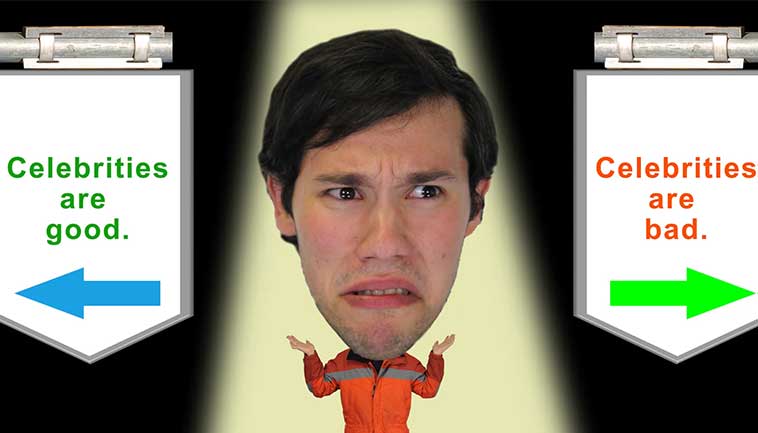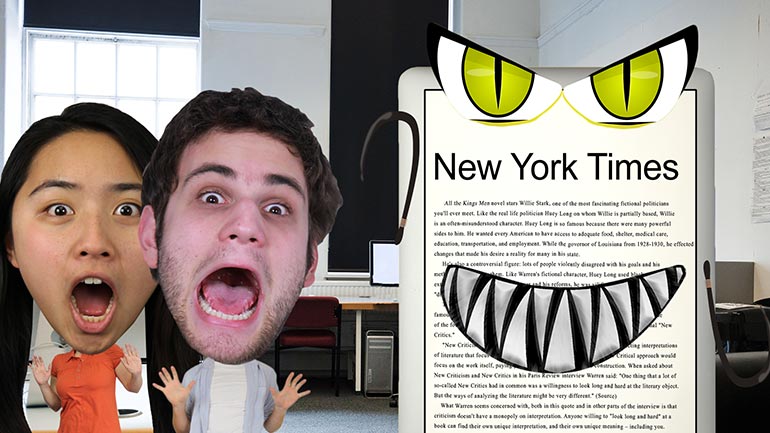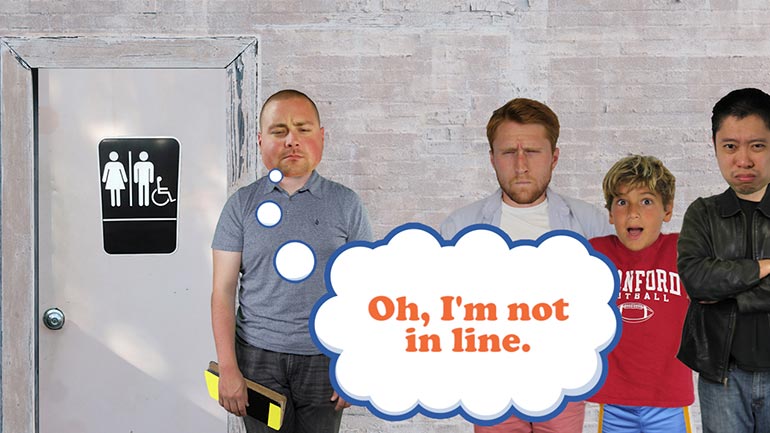ShmoopTube
Where Monty Python meets your 10th grade teacher.
Search Thousands of Shmoop Videos
Web Literacy: Argument 587 Views
Share It!
Transcript
- 00:01
We speak student!
- 00:06
Using Arguments from the Web
- 00:09
[ bird caws ]
- 00:10
How can I support my argument with Internet research?
- 00:14
Basically, in order to make an argument based on Internet research,
Full Transcript
- 00:17
you're gonna just do everything we've already talked about
- 00:19
in the previous lessons.
- 00:20
So this is a nice way to review all those strategies.
- 00:23
The assignment is,
- 00:24
"Here's your topic. Make an argument for or against it
- 00:27
and cite sources."
- 00:29
So what you're gonna do is
- 00:31
first, do that Google search.
- 00:33
Try to see what you can find.
- 00:35
You're gonna then evaluate the credibility of your sources.
- 00:38
If something's completely not usable,
- 00:41
just throw it out.
- 00:42
If you get TMZ or something like that
- 00:44
or a tabloid, you're probably not gonna wanna use it.
- 00:46
Throw it out.
- 00:46
If you get something that's biased,
- 00:48
subjective in one way or another,
- 00:50
you don't have to throw it out yet, that's totally fine.
- 00:52
But you'll get all your sources together.
- 00:55
That's when you're gonna read through your sources.
- 00:56
As you're reading through, you're gonna keep in mind
- 00:58
what's subjective? What's biased? What's not?
- 01:01
And then you're gonna decide
- 01:02
do I agree with this source?
- 01:05
So let's say you end up with three sources.
- 01:07
Read them through.
- 01:08
Do I agree with number one, number two, number three?
- 01:10
Are they all saying the same thing?
- 01:12
Are they saying different things?
- 01:13
And then you're gonna say,
- 01:14
"Okay, you know what?
- 01:15
I disagree with source number one,
- 01:17
agree with source number two,
- 01:19
and disagree with source number three."
- 01:20
Does that mean we throw out one and three?
- 01:23
No. It means you use those to prove your own point.
- 01:27
That's the counterargument.
- 01:29
You say, "Source one says this,
- 01:31
but they're wrong."
- 01:32
So walk us through an example.
- 01:34
Give us three sources
- 01:36
we'd look at -
- 01:37
good, bad, ugly, whatever. Something in between.
- 01:40
And we kind of use that to our advantage.
- 01:44
Okay. So let's say there's an article,
- 01:46
"Do Celebrities Use Their Power for Good?"
- 01:49
That's the topic.
- 01:50
And you're arguing either "yes they do" or "no they don't."
- 01:52
So we have three sources.
- 01:55
First we've gone through all the junk and we've
- 01:58
filtered it out.
- 01:59
We found a tabloid, but we were like,
- 02:01
"Eh, that person's actually still alive.
- 02:02
It said they were dead.
- 02:03
That baby doesn't have eight heads."
- 02:04
So you moved it to the side.
- 02:06
You end up with three sources.
- 02:07
You have an article from People magazine
- 02:10
that you have kept because it actually
- 02:12
cites celebrities giving quotes.
- 02:15
People magazine, in most cases,
- 02:16
is not gonna be something you're gonna cite in a school paper.
- 02:18
But if you're writing an article
- 02:20
about whether or not celebrities do good,
- 02:22
you can actually get quotes
- 02:24
from celebrities from this.
- 02:25
So you're gonna keep in mind that
- 02:27
it's not necessarily the most credible source,
- 02:28
but you're gonna use it.
- 02:29
The next thing you're gonna use is
- 02:31
an article from the New York Times
- 02:33
about Angelina Jolie and Brad Pitt
- 02:36
and what they have done for the world.
- 02:39
And just to kind of highlight that,
- 02:42
you think about what celebrities do that you read about
- 02:45
that you get lots of press for.
- 02:47
You read, I don't know, various celebrities
- 02:52
typically finding large constituencies
- 02:54
and they put themselves at the front
- 02:56
to be the spokesperson for it.
- 02:58
Like Matt Damon trying to be a neutral voice on teaching
- 03:00
out of the teacher's union,
- 03:01
even though his mother is a teacher.
- 03:03
He's trying to present himself as a credible, neutral source.
- 03:06
You have other elements that --
- 03:08
I guess things celebrities do
- 03:12
that nobody writes about
- 03:14
that are actually acts of kindness or good.
- 03:17
So the Angelina and Brad thing is kind of interesting to me
- 03:22
because they practice what they preach.
- 03:24
They actually did it.
- 03:26
And you don't adopt a child for a press release.
- 03:28
A lot more work than that would be worth.
- 03:30
So there it's a different respect.
- 03:33
They actually are doing something they really believe in,
- 03:36
not just to get lots of people to go to buy tickets to go to their next movie.
- 03:40
So the whole notion of doing good and defining things ahead of time...
- 03:44
Is that something we should be doing
- 03:46
before we write the paper?
- 03:48
Meaning do you come into it with an opinion?
- 03:50
That it's research you're ferreting out
- 03:52
so that you look like today's cable news network
- 03:55
and you're supporting either the Republicans or the Democrats?
- 03:57
Or is it more like
- 03:59
you're actually trying to figure out...
- 04:01
Like, is this all a waste of...
- 04:03
Yeah, you're always gonna come in with an opinion.
- 04:04
Almost always you're gonna come in with an opinion.
- 04:06
But allow yourself to be proven wrong.
- 04:09
It's never a bad thing to find out you're wrong.
- 04:13
But you don't necessarily have to
- 04:16
or you shouldn't necessarily come in with an opinion.
- 04:19
But you need to understand
- 04:21
that everyone you are reading
- 04:22
is going to have an opinion.
- 04:24
So if you come into this thinking,
- 04:27
"Oh, celebrities are -- They're all hypocrites,
- 04:30
they're not actually doing good things."
- 04:32
Then you're gonna find --
- 04:34
in whatever you read,
- 04:36
you're gonna find support for your argument.
- 04:38
If you come with a clean slate,
- 04:40
you'll be a little bit more open
- 04:42
to seeing both sides of it.
- 04:43
Academics do this all the time.
- 04:45
They're like, "Oh, you know what would make a really cool paper?
- 04:47
If I wrote about how this specific author
- 04:50
was influenced by this specific author."
- 04:52
And then everything you read
- 04:55
by author number one,
- 04:56
you're like, "Aha, this is very Hemingway-esque, isn't it?"
- 05:00
But if you weren't trying to prove that point,
- 05:02
you might not see it.
- 05:03
So if you do come in with your own opinion,
- 05:06
take a step back and remember that
- 05:08
so that you don't only see that in the sources you've got.
- 05:11
To come back to your point,
- 05:13
the example. So let's say your third source, then,
- 05:15
is a blog entry by a respected journalist.
- 05:21
The feature editor of Time magazine,
- 05:23
for example,
- 05:24
writes a piece about how celebrities are hypocrites
- 05:28
and they say they're trying to save the world
- 05:32
via the environment
- 05:33
and then they take their private jet to get there.
- 05:35
Tons of examples there.
- 05:37
So then you read all these things through and you're like,
- 05:40
"Okay, piece here, piece here.
- 05:42
This is what the celebrities say, this is what this person says."
- 05:44
You have to acknowledge all their biases
- 05:47
and then you're gonna say,
- 05:49
"What do I think?"
- 05:50
And you can think either way.
- 05:51
There is no -- This is an argument; it's an opinion.
- 05:54
You have an opinion. You can say,
- 05:55
"Yes, celebrities are hypocrites.
- 05:57
They're not doing good for the world."
- 05:58
Or you can say,
- 05:59
"No, man, like have you seen?
- 06:00
They do so much good for the world.
- 06:02
Celebrities do use their power for good."
- 06:03
Number one thing - just pick a side.
- 06:05
If you're wishy-washy about it,
- 06:07
it's not good.
- 06:08
Your teacher isn't trying to see if you can
- 06:12
get all of the nuances of the...
- 06:14
They're trying to see if you can write an argument paper.
- 06:16
So pick an argument and stick with it.
- 06:19
So then what you're gonna do
- 06:20
is use all three of these sources.
- 06:23
The ones that you agree with --
- 06:24
Let's say I've decided that celebrities are hypocrites.
- 06:27
That blog entry that says that,
- 06:29
I'm gonna use that as my support
- 06:31
and I'm gonna say,
- 06:32
"As this respected journalist says,
- 06:34
X, Y, and Z. Celebrities are hypocrites.
- 06:37
They take their private jets.
- 06:38
Here's an example they give."
- 06:39
But then I'm gonna use the other sources
- 06:42
as counterexamples.
- 06:44
So I'm gonna say,
- 06:45
"Yes, as the author of this New York Times article says,
- 06:48
Brad and Angelina have given X amount of money
- 06:50
and they have flown to Africa
- 06:52
and all over the world and adopted children.
- 06:54
But that's an edge case.
- 06:56
That's one example.
- 06:58
That journalist only talked about Angelina and Brad.
- 07:00
My source number three gave 15 examples of the opposite."
- 07:04
So basically what you're gonna then do
- 07:06
is use your sources,
- 07:08
whether you agree with them or not,
- 07:09
to support your own argument.
- 07:11
And then we get into the whole
- 07:12
always acknowledge the counterargument,
- 07:14
five paragraph essay and all that.
- 07:16
That's a different course.
- 07:17
But that's how you're gonna use
- 07:19
your Internet sources
- 07:21
to make your argument.
- 07:23
You're gonna find your sources,
- 07:25
evaluate them, read them,
- 07:27
decide if you agree or disagree,
- 07:29
and then use them as support.
- 07:33
[ pen writing ]
- 07:36
How can you use Internet research to make a good argument?
- 07:40
How important are sources?
- 07:43
Am I allowed to be subjective?
- 07:50
I have no idea what you want me to say here. [ chuckles ]
Related Videos
What's the difference between a real estate agent and a real estate broker? Is the latter just, uh... out of cash? Quite the opposite, in fact. Jum...
So... what's a TSA worker, and what do they do? Oh, we thought maybe you knew. Okay, okay... so TSA (or Transportation Security Administration) wor...













